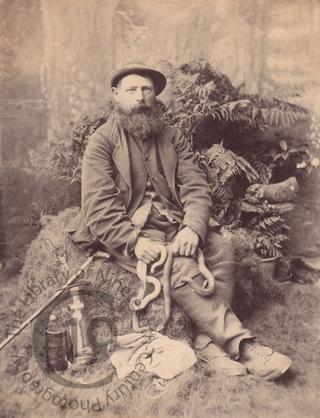
Brusher Mills
An albumen print portrait of ‘Brusher’ Mills (1840-1905), a hermit who lived in the New Forest and made his living as a snake-catcher. He eventually became a local celebrity and an attraction for visitors to the area. He regularly attended cricket matches at nearby Balmer Lawn, where he was paid to sweep the pitch between innings, thus earning the nickname ‘Brusher’ Mills.
Born Harry Mills on 19 March 1840 near Romsey, he lived at Emery Down near Lyndhurst until at least 1861. Around 1880 he took up residence in an old charcoal burner’s hut – built of turf sods with a hole at the top to let out smoke – in the woodlands near Sporelake Lawn, an open clearing in the New Forest about 1 mile north of Brockenhurst in Hampshire. He earned a living by ridding local properties of snakes, mainly grass snakes but also adders, armed with only a sack and a forked stick. Some he supplied to London Zoo as food for their birds of prey, others he turned into ointments and potions, which he sold to locals and curious tourists as a cure for rheumatism. He is thought to have caught over 32,000 snakes in his lifetime and his fame eventually grew to the extent that he became a draw for visitors to the New Forest, many of whom he entertained in his hut with tea and tales of country lore.
He lived in this manner for nearly 30 years. One journalist who sought him out described ‘a curious figure coming down the green track, rather like Robinson Crusoe in appearance. A slouch hat, a tattered coat – once blue – with great pockets down to the knees, corduroy trousers and leathern gaiters, a complicated tangle of straps and cords and bags of some sacking stuff about his person. […] His face and hands were tanned by sun and exposure to a deep mahogany tint, his grizzly hair and beard and shaggy eyebrows were entirely unkempt, and his little brown eyes darted sharply hither and thither as he came towards me’ (St James’s Gazette, 12 August 1893).
In later life took up residence in an outbuilding of one of his favourite pubs, the Railway Inn in Brockenhurst, where he died on 1 July 1905. A marble headstone, paid for by locals, was erected over his grave in the churchyard of St Nicholas in Brockenhurst. It includes a carved tableau of him at work. The Railway Inn which he so often frequented was renamed The Snakecatcher and is still in business today.
Photographer unidentified but possibly by John Golden Short.
Code: 126792




